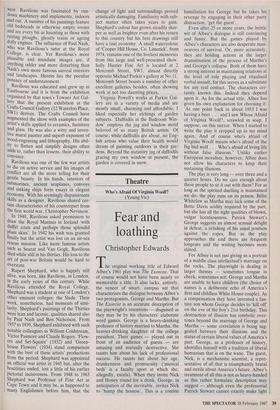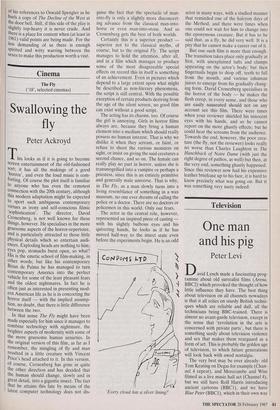Theatre
Who's Afraid Of Virginia Woolf? (Young Vic)
Fear and loathing
Christopher Edwards
The original working title of Edward Albee's 1961 play was The Exorcist. That of course would not have been nearly so memorable a title. It also lacks, entirely, the veneer of smart, campus wit that characterises the dialogue between Albee's two protagonists, George and Martha. But The Exorcist is an accurate description of the playwright's intentions — disguised as they may be by his characters' elaborate word games. George is a heavy-drinking professor of history married to Martha, the heavier-drinking daughter of the college president. Their games — played out in front of an audience of guests — are amusing and mutually destructive. She taunts him about his lack of professional success. He taunts her about her age, drunkenness and promiscuity (`musical beds' is a faculty sport at which she, allegedly, excels). When they invite Nick and Honey round for a drink, George, in anticipation of the inevitable, invites Nick to 'hump the hostess'. This is a routine humiliation for George but he takes his revenge by engaging in their other party distraction, 'get the guest'.
Even after 25 or more years, the brittle wit of Albee's dialogue is still convincing and funny. But the games played by Albee's characters are also desperate man- oeuvres of survival. Or, more accurately, they are holding actions in the larger dramatisation of the process of Martha's and George's collapse. Both of them have a strong interest in maintaining relations at the level of role playing and ritualised verbal assault, for this serves as a substitute for any real contact. The characters cer- tainly known this. Indeed they depend upon it. As for the actual title, Albee has given his own explanation for choosing it: `At one point back in about 1953 I was having a beer . . . and I saw Whose Afraid of Virginia Woolf?, scrawled in soap, I suppose, on this mirror. When I started to write the play it cropped up in my mind again. And of course who's afraid of Virginia Woolf means who's afraid of the big bad wolf . . . Who's afraid of living life without false illusions.' Unlike earlier European moralists, however, Albee does not allow his characters to keep their sustaining illusions.
The play is very long — over three and a quarter hours. Do we care enough about these people to sit it out with them? For as long as the spirited duelling is maintained we do: the play runs on its poison. Billie Whitelaw as Martha may lack some of the Bette Davis acidity required by the part, but she has all the right qualities of blown, vulgar licentiousness. Patrick Stewart's George suggests an almost sensual delight in defeat, a relishing of his usual position against the ropes. But as the play approaches the end there are frequent longeurs and the writing becomes more stilted.
For Albee is not just giving us a portrait of a middle class intellectual's marriage on the rocks. The playwright is dealing in larger themes — sometimes tongue in cheek, sometimes not. George and Martha are unable to have children (the choice of names is a deliberate echo of America's first and childless White House couple). As a compensation they have invented a fan- tasy son whom George decides to 'kill off' on the eve of the boy's 21st birthday. This destruction of illusion has symbolic over- tones beyond the marriage of George and Martha — some correlation is being sug- gested between their illusions and the status of certain liberal values of America's past. George, as a professor of history, identifies himself with a tradition of liberal humanism that is on the wane. The guest, Nick, is a mechanistic scientist, a repre- sentative of all that is triumphantly brutal and sterile about America's future. Albee's treatment of all this is not as heavy-handed as this rather formulaic description may suggest — although even the professorial Patrick Stewart cannot exactly make light of his references to Oswald Spengler as he hurls a copy of The Decline of the West at the door bell. Still, if this side of the play is slightly top-heavy it is never crude. And there is a place for content when (at least in 1961) valid points are being made. For the less demanding of us there is enough spirited and witty warring between the sexes to make this production worth a visit.



















































 Previous page
Previous page